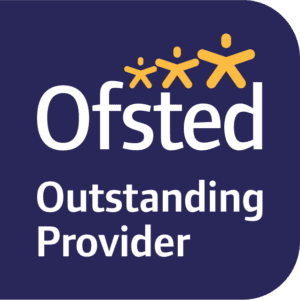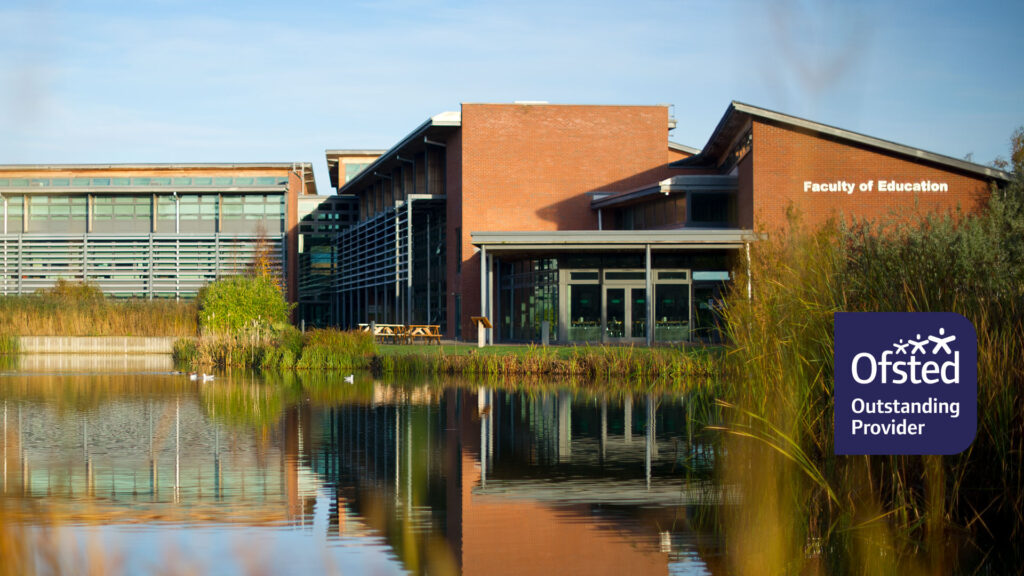Primary Early Years Education with QTS PGCE
GOV.UK code: X124
Discover how to ignite pupils’ curiosity and foster their enthusiasm for learning on this degree. You’ll specialise in training to teach children 3-7 years and gain recommendation for Qualified Teacher Status.
Overview
| Course length: | 1 year full-time |
|---|---|
| Start dates: | September 2024 September 2025 |
| Location: | Edge Hill University |
| Subject(s): | Education and Teaching |
| Faculty: | Education |
| Department: | Early Years Education |

If you have a passion for teaching children 3-11 years, join us on this degree and gain recommendation for QTS (Qualified Teacher Status). Specialise in the early years phase, teaching children 3-7 years and make significant contribution to their learning and development.
This primary early years teaching degree covers the essential skills and knowledge you’ll need for teaching children aged 3-11 with a specialism in the 3-7 age phase. This includes primary schools, nurseries and children’s centres.
Whatever undergraduate degree you studied, this course will help you develop your expertise and understanding of how children learn. You’ll study both the national curriculum and the EYFS statutory curriculum, and build up your knowledge in the subjects you will be teaching. Your tutors and school-based mentors will help you to become teachers with a strong sense of social justice, advocating for children’s rights, challenging inequality, and supporting global sustainability.
With your recommendation for Qualified Teacher Status (QTS), on graduation you could teach in early years foundation stage (EYFS), key stage 1, and key stage 2.

Course features
-
Ofsted outstanding provider for Initial Teacher Education
-
Professional accreditation
-
Professional practice placements
-
International students can apply
What you'll study
There are three key parts to the course. The first is Personal and Professional Attitudes, Values and Beliefs. You’ll learn to take charge of, and reflect on, your own progress as a trainee teacher. And consider what your professional attitudes, values and beliefs are when it comes to your learning journey and the education profession.
The second element is Subject and Curriculum Knowledge. This covers the national curriculum at key stage one for every subject, showing you how to plan, teach, and assess primary age pupils. You’ll learn about the early years foundation stage and learning and development areas within this too.
Finally, there’s the Craft of Teaching and Pedagogy. You’ll complete a small research project and discover the important theories behind early years education. Discovering the ways children learn and how their needs differ, you’ll come up with strategies for planning, teaching, assessing, and managing classrooms.
How you'll study
A combination of academic study, group discussion and reflection, practical and work-based learning in the classroom will give you the knowledge and skills you need to become an excellent teacher. You will be supported by online and distance learning materials and encouraged to develop key skills, including the use of ICT, to support your own learning.
The course involves a significant amount of time in schools and settings. You will complete a series of placements in early years foundation stage classrooms (age range 3-5 years) and key stage 1 classrooms (age range 5-7 years). Here, you will work alongside mentors and peers to further your professional development.
You will also undertake Intensive Training and Practice (ITAP) as a specific and focused element of our teacher training curriculum. This is designed to consolidate your knowledge for effective teaching, and enable you to rehearse and obtain feedback from experts on your practice. Our ITAPs are designed to utilise the latest research and technology as well as draw on the outstanding mentors, tutors, and teacher expertise from across the partnership.
In schools and early years settings you will undertake a range of differentiated training experiences which will be closely linked to your individual targets. Your teaching timetable will increase in relation to responsibility, as your training progresses and you become more confident and competent in the classroom. You will progressively assume the responsibility for the children and their achievement and progress, involving excellence in teaching, learning and assessment.
How you'll be assessed
A balanced combination of coursework and observed classroom experience will be assessed against the professional standards for QTS.
Before the end of your PGCE you will need to complete a professional portfolio which acts as a useful bridge between your initial teacher training programme and your two-year induction as an early career teacher.
Who will be teaching you
The Faculty of Education has been at the forefront of teacher education for more than 135 years and today enjoys the enviable position of being one of the country’s leading providers of education, training and research for the children’s workforce.
The teaching team delivering this programme has a wide range of experience and expertise as early years practitioners, local authority advisers, teachers in school and university tutors. They are committed to being at the forefront of developments and research within early years education.
Entry criteria
Entry requirements
When you apply, you are expected to have:
- A first or second class Honours degree from a UK university (or equivalent qualification)
- GCSE English Language or English Literature, GCSE Mathematics and GCSE Science at Grade C or Grade 4 or above (or equivalent)
- Sufficient levels of information and communications technology competence to access course materials e.g. virtual learning environment, email, video conferencing software
- A commitment to, and understanding of, primary early years education, demonstrating the personal attributes, values and motivation required to train as a teacher
An interview forms part of the selection process, which can be conducted online or face to face.
Please note, for the purposes of initial teacher training, level 2 literacy and numeracy qualifications are not considered as equivalent to GCSE Grade C or Grade 4 in English Language or English Literature and Mathematics.
If you accept a formal offer from Edge Hill University you will be required to meet the Department for Education’s standards for physical and mental fitness to teach and clearance to work with children. Further information, including a Declaration of Health questionnaire and details of how to apply for a Disclosure and Barring Service (DBS) Enhanced Disclosure will be sent to you after you have firmly accepted an offer.
English language requirements
International students require IELTS 6.5, with a score no lower than 6.0 in each individual component, or an equivalent English language qualification.
If your current level of English is half a band, one band, or one-and-a-half bands lower, either overall or in one or two elements, you may want to consider our Pre-Sessional English course.
How to apply
Apply full-time
Read our guide to applying for PGCEs and Postgraduate Teacher Training to find out more about the application process.
International
Please see our international student pages for further information about how to apply as a prospective international student.
Should you accept an offer of a place to study with us and formally enrol as a student, you will be subject to the provisions of the regulations, rules, codes, conditions and policies which apply to our students. These are available at www.edgehill.ac.uk/studentterms.
There’s plenty of opportunities to come take a look around campus. Attend one of our open days to see what life at Edge Hill University is all about.
Book an open day
Facilities
 Housed in a state-of-the-art £9million building, the Faculty of Education at Edge Hill University enjoys a stunning setting from both its lakeside and piazza buildings.
Housed in a state-of-the-art £9million building, the Faculty of Education at Edge Hill University enjoys a stunning setting from both its lakeside and piazza buildings.
Facilities in the lakeside building include a 300-seat lecture theatre, five well-equipped ICT suites, and 18 teaching rooms complete with the latest technology. The lakeside building is also home to a popular vegan and vegetarian cafe where students can meet to socialise and discuss their studies.
The nearby piazza building offers modern facilities including a lecture theatre and a number of seminar rooms.
Where you'll study
Faculty of Education
Finance
Tuition fees
UK Full-Time
£9,250
for the course
International
£16,500
for the course
EU/EEA and Swiss students who have settled or pre-settled status under the EU Settlement Scheme, as well as Irish nationals, may be eligible for the UK tuition fee rate.
Financial support
Applicants to Student Finance should apply for undergraduate funding and not a postgraduate loan. Subject to eligibility, UK students joining this course can apply for an additional Bursary from the government. Please see updated eligibility from the bursaries and scholarships page.
Subject to eligibility, UK students joining this course can apply for a Tuition Fee Loan from the Government to cover the full cost of tuition fees. UK students enrolling on the course may also be eligible to apply for additional maintenance loan funding to help with living costs. Please view the relevant Money Matters guide for comprehensive information about the financial support available to eligible UK students, together with details of how to apply for potential funding.
EU/EEA and Swiss students who have settled or pre-settled status under the EU Settlement Scheme may be eligible to apply for financial support. Irish nationals can ordinarily apply to Student Universal Support Ireland (SUSI). If you are an EU student who does not have settled or pre-settled status, or are an international student from a non-EU country, please see our international student finance pages.
Your future career
This PGCE is accredited by the Department for Education. Successful completion of the programme will enable you to gain recommendation for Qualified Teacher Status (QTS). You will be well placed to progress into employment as an Early Career Teacher in early years and primary settings.
Graduates work in schools across the UK and abroad. You’ll have the essential skills for teaching in primary schools and early years settings, and have excellent knowledge of primary education and great classroom skills. You’ll meet and exceed the national standards for Qualified Teacher Status.
You’ll know how to teach the early years foundation stage curriculum in creative ways, stimulating children and encouraging them to feel excited about learning new things. And you’ll know how to keep track of your own personal development, and keep a critical and analytical eye on education sector developments and policy changes.
Course changes
Every effort has been made to ensure the accuracy of this information, however our courses are subject to ongoing review and development. Changing circumstances may necessitate alteration to, or the cancellation of, courses.
Changes may be necessary to comply with the requirements of professional bodies, revisions to subject benchmarks statements, to keep courses updated and contemporary, or as a result of student feedback. We reserve the right to make variations if we consider such action to be necessary or in the best interests of students.











